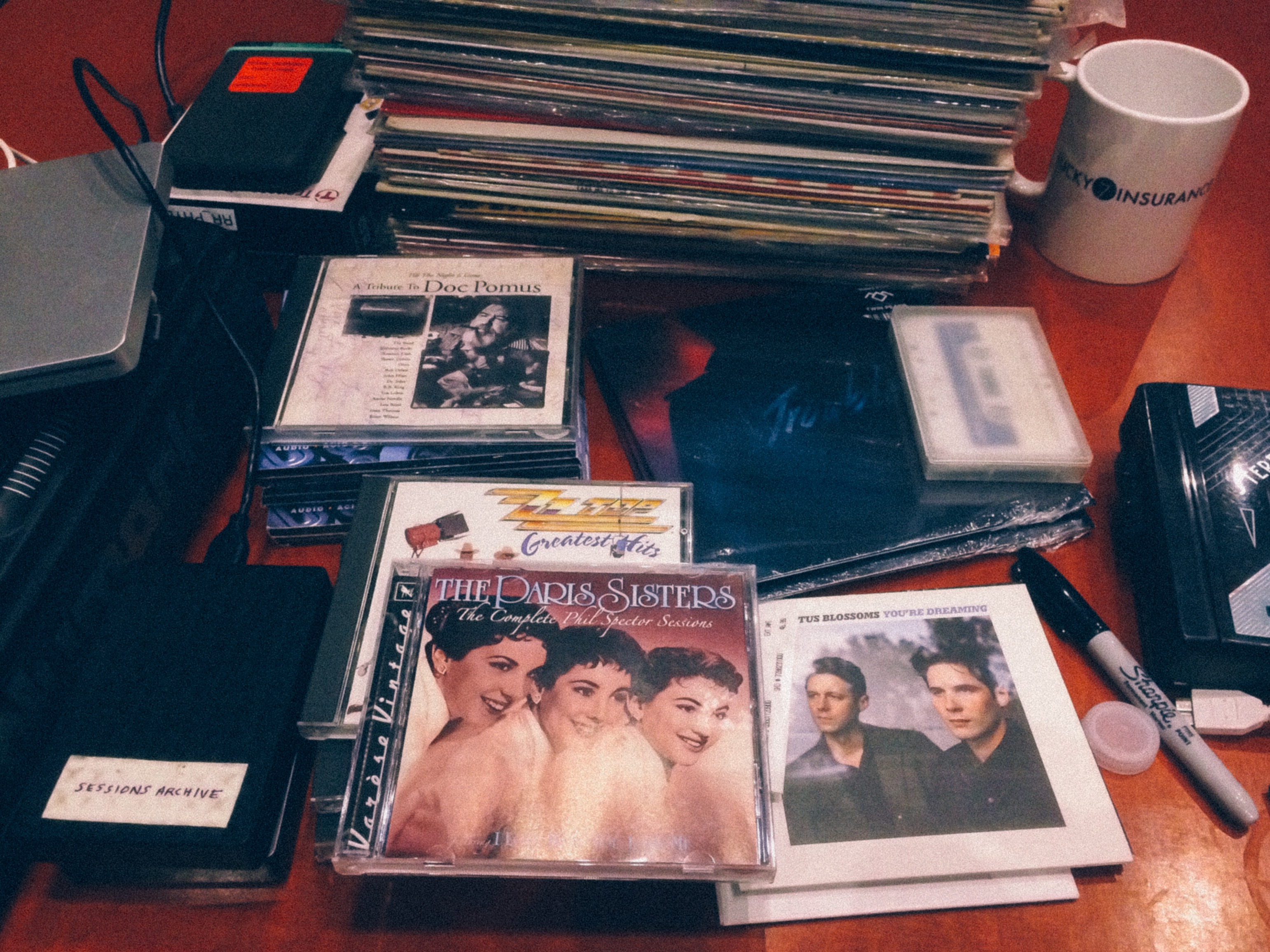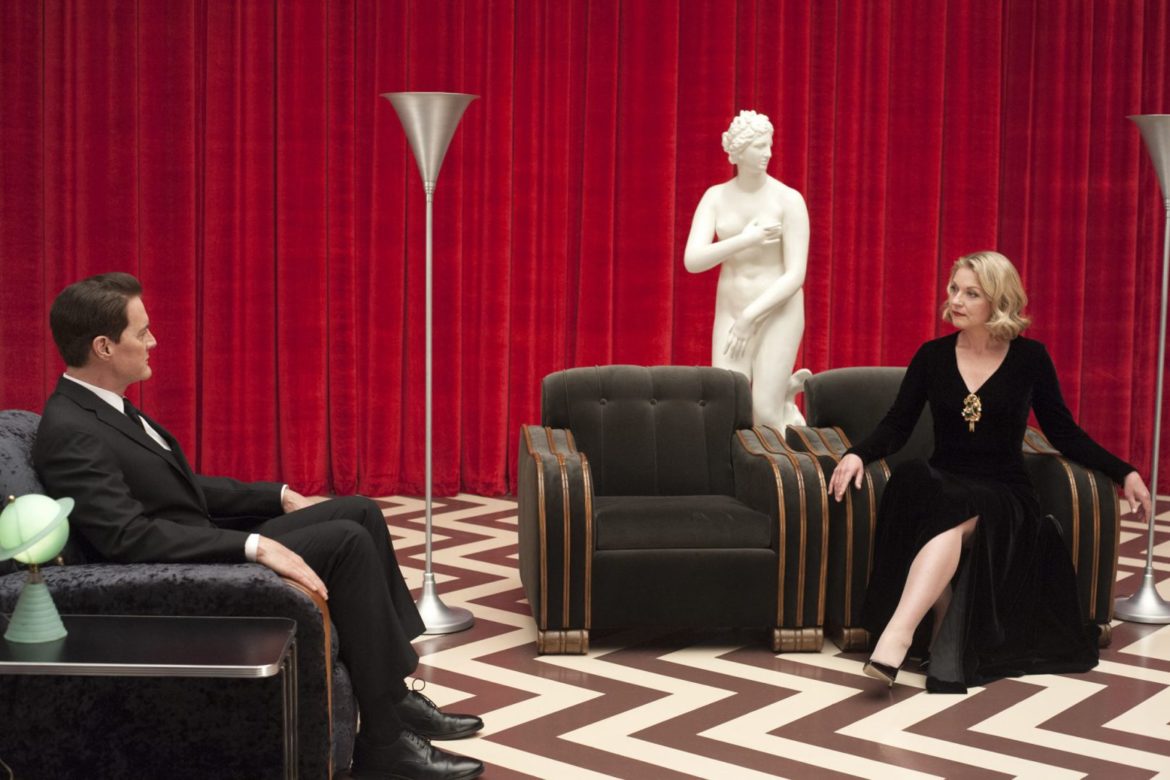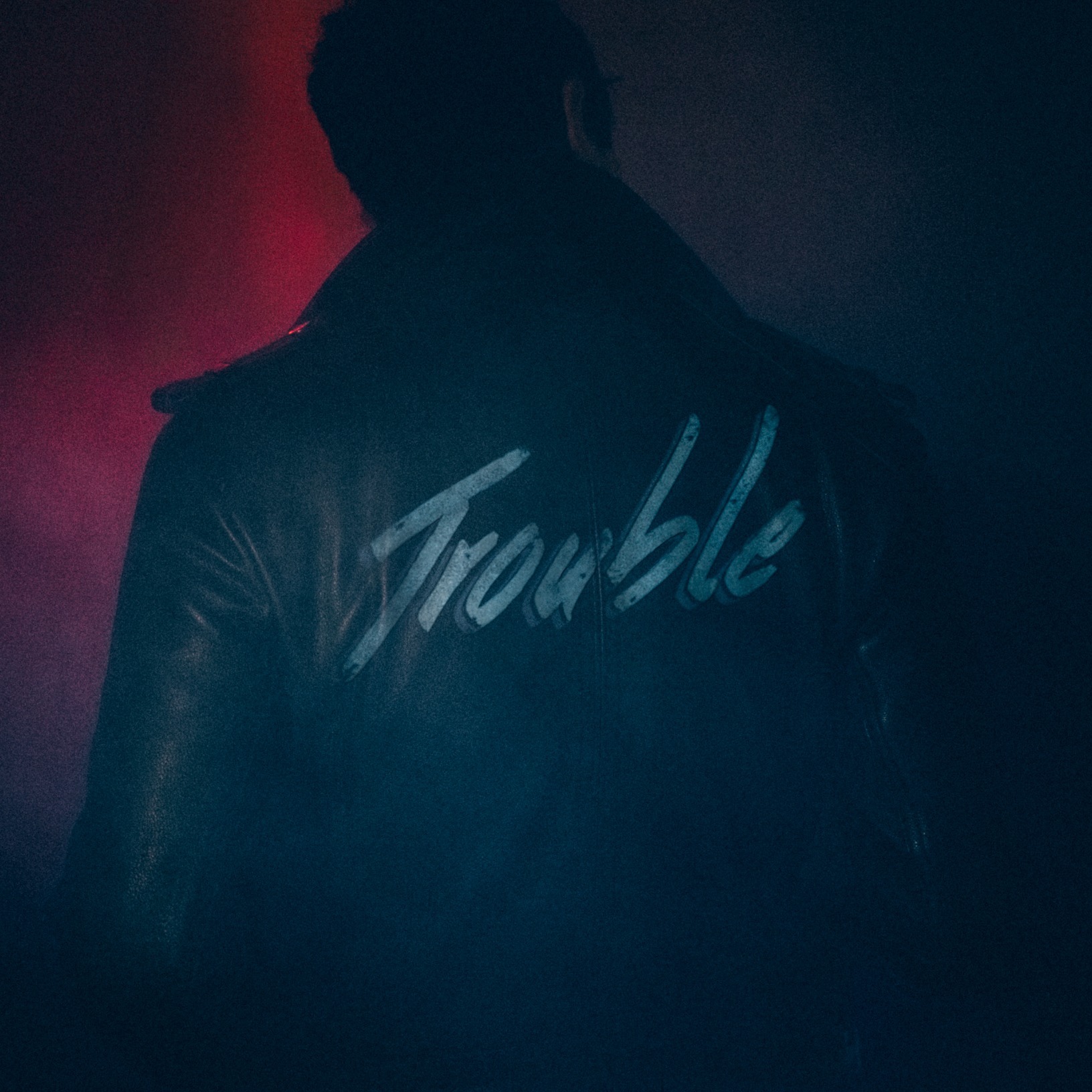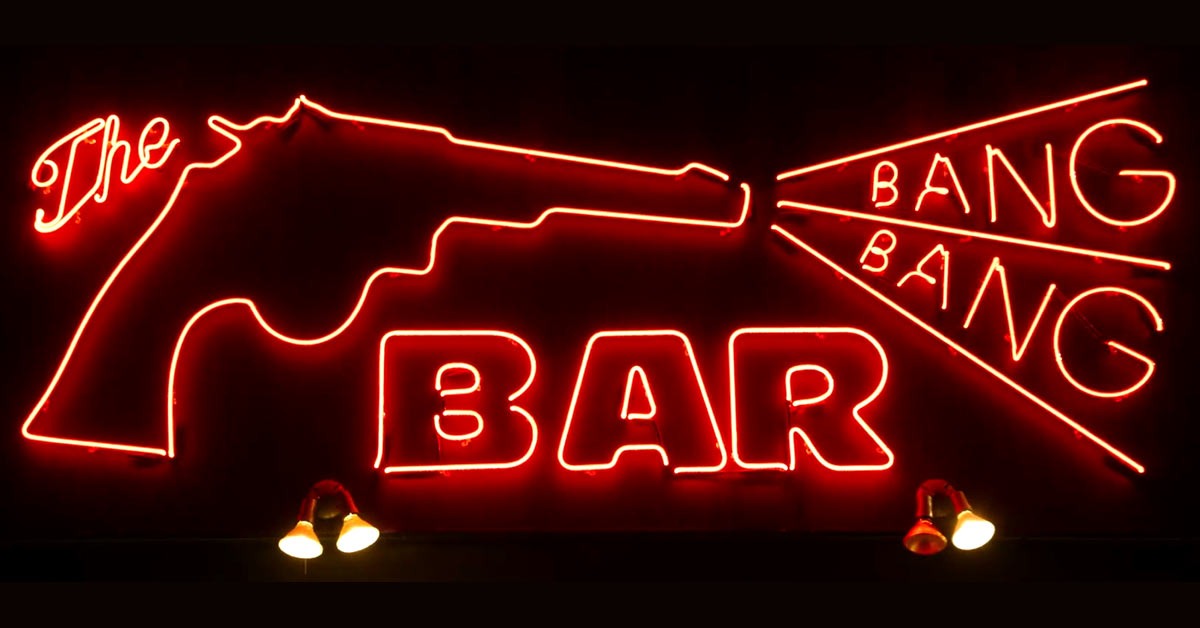In Part 2 of our conversation with David Lynch’s right-hand music man Dean Hurley, we discuss forming the band Trouble with Lynch’s son Riley, Nine Inch Nails, lessons he’s learnt from the director and more. Missed Part 1? Check it out here.
As well as writing music for the show with David, you also perform as part of the band Trouble with his son Riley.
Yeah. When I first started this job I attended Riley’s 13th birthday party, and I remember giving him one of those 9-volt battery powered Marshall amps with a belt clip on it as a gift. Throughout the whole party he was just roaming around playing his guitar and from there onwards he’d come home from school and we’d jam in the studio when nothing else was going on. He’s a phenomenal guitarist, and he’s really interested in the super technical version of metal and the guys who play eight/nine stringed guitars whose finger dexterity is just insane. So that’s where Riley flourishes and where his interests lie.
When we were talking about the Roadhouse scenes he was like, “Man, I would love to write a song and have it in the show.” There was no nepotism involved – David was like, “Okay, well, play something for me, but it better be fucking great.” So we talked about what we could do. At that time we didn’t have the entire line-up rounded out and a lot of the acts were leaning on the more pretty and ethereal side of things, so we knew we were lacking on the more hard-edged stuff. I brought my friend Alex Zhang Hungtai into the fold to play sax, and we just came up with the band Trouble. We wanted to represent that classic Roadhouse vibe from an era where those joints were filled with bands playing hard driving blues music.
And on the theme of harder music, you had Nine Inch Nails performing in Part 8. How did that happen?
David really wanted Trent involved in the show. He didn’t really care if it was Nine Inch Nails or one of Trent’s other projects, he just wanted him involved. So we reached out to him and they sent over the track “She’s Gone Away”. At the time it was unreleased, so I still don’t know if that track was specifically written for the show. I have a hunch that maybe it was or at least he had just recorded it. There are some interesting tie-ins with the lyrics, and it seems like something that was customized for the show. David wanted more of a harder, hairy edge sound in the show, and so that was perfectly suited.
“David really wanted Trent (Rezner) involved in the show. He didn’t really care if it was Nine Inch Nails or one of Trent’s other projects, he just wanted him involved.”
And then there’s the other uses of music in Part 8, including Penderecki’s “Threnody to the Victims of Hiroshima”
Yeah. David’s a big Penderecki fan – there was a ton of Penderecki in Inland Empire and in Wild at Heart. That guy is able to do something very specific and unique, and it speaks to David because it’s just so visceral and unfiltered. Whenever something requires the extreme, I think that’s David’s go-to in terms of score. I think that scene is particularly fascinating because there is this whole collapsing of time. It’s like the atomic test is actually scored with the thing that in reality was a product of what ultimately the test would inspire. The composition is literally a lament to the bomb’s victims. So it’s a cool usage because it’s this thought-provoking collapse of time, which is a big theme in the show.
Yeah. And then you’ve got The Platters song, which you mentioned earlier, which was written into the script.
Yeah, that’s a perfect usage. I thought The Platters were the writers of that song, but while I was working on the show my wife was really big into The Ink Spots. She would play them while bathing our child, so I would hear The Platters version at work, and the Ink Spots version at home. Talk about a weird juxtaposition there.
That sounds like a David Lynch film all in itself!
It was. It was like, I cannot escape this.
We also just read that one of the original members of The Platters was called David Lynch!
What! Really? That blows my mind. That’s a great example of serendipity at work. You keep turning these things over and you find these relationships that aren’t necessarily designed in the usage.
Awesome. Who would you say is your favourite character in terms of musical cues?
That’s a good question. It’s not really like the original where they had musical motifs or phrases that were directly assigned to characters. This season is a totally different beast, and it obviously has less music. As a director, I think David’s tastes have shifted through the years in terms of utilizing heavy music versus letting a scene stand more unadorned.
There are definitely a few examples though, one of them being that hip-hop instrumental that was used for Ike “the Spike’s” storyline . That was something David discovered – he’ll get excited and call me down to his office and say, “Hey, you’ve got to check this out. I just found this online.” He played that for me and I just thought he was playing me a song, because obviously I could not imagine that in Twin Peaks. He was like, “Yeah, I think I want to use it”, and I was like, “Really?!” I’m thinking in my head, “Where the hell would this go?”. To his credit, he worked it into the picture and found a place for it.
That’s amazing. We loved the “Take Five” scene with Dougie.
Yeah. The thing about that which is cool is that I honestly feel like some of the original series music was directly inspired by that particular brand of cool jazz. Even though I don’t know this for sure, I can almost hear David saying, “We need something that feels like Take Five.” You know, it just makes you want to snap your finger. I feel like using that track all these years later is kind of fitting.

Some of the music collection at Asymmetrical Studios
You said in an interview that one of the lessons you’ve learnt from David is knowing when to finish a project and walk away. What are some of your other big takeaways?
Yeah, that is one of them for sure. I think another big lesson for me is that capturing inspiration is a really sacred thing. You have to do it all the time, even if you’re scribbling in a pocket notebook that you carry around, because these things kind of drop out of nowhere. If you have the ability to capture the stuff and write it down when it happens, later it allows you to sort through it, make an editorial choice, and use your taste to deem what is worth using. That happens with music for sure, especially with David. You then have this wealth of material that is going to work better than anything done on the nose. In a traditional scoring sense you’re like, okay, here’s the scene, now write the music to it. And even if it works, it’s just going to feel one dimensional.
You have these pieces you created or discovered years ago that you think are awesome, but there’s no use for them so you forget about it. And then one day there’s like this golden spot shining on a particular piece and you realize it’s perfect for something. That sort of thing happened a lot in Twin Peaks – there was a lot of touchstone pieces that David would continually goes back to. One of those pieces is “Green Onions”, which obviously everybody loves, and it’s been used in a ton of films . He’s always loved that song and he wanted an opportunity to use it. And sure, you can slug it into any old scene, but the way it’s used in this show is uniquely him. It’s not like that scene is a particularly incredible scene, but I think it’s an incredible usage of that song.
So it’s all about being creatively open but also knowing when to walk away?
Yeah, being open creatively and knowing when to walk away. There’s this tunnel vision that happens sometimes when working on media like this – a driving feeling of, “Could it be better?”, “Is this good enough?”, “Could we push this more?” David’s always been a ‘seeing the forest from the trees’ kind of guy. Usually he’s pulled me off of things at the right moment, even when I’m kicking and screaming, only to look back and be like, yeah, there is an energy and roughness there that would have been eradicated if I had continued on that path, and it wouldn’t have been the same. That’s an important quality. In the experiences that I’ve had working with other directors, you see that sometimes people misjudge that getting something right means getting it perfect. And it’s really more like getting something right means knowing when to step away. And that even though it might not be perfect, it is in fact right.
“In the experiences that I’ve had working with other directors, you see that sometimes people misjudge that getting something right means getting it perfect. And it’s really more like getting something right means knowing when to step away. And that even though it might not be perfect, it is in fact right.”
That’s so true. So we’re about half way through Twin Peaks: The Return now, can you tell us anything at all about the rest of the series?
There’s a lot of cool things to come. I’m just fortunate to have been taken along for the ride and to get these windows into David and Angelo. Being able to supplement them creatively in the ways that I have has been really rewarding. I hope people are enjoying it.
What are you up to at the moment? Are there more projects with David in the pipeline?
Honestly, he hasn’t even switched gears yet. We’re finishing up the Twin Peaks soundtracks – I’ve been working heavily with Rhino Records on those. There’s two soundtracks with 38 tracks total that come out on September 8th – one is dedicated to all the Roadhouse performances and the needle drop music in the show. The other is more score and is heavily centered around Angelo’s music. I’m also mixing an album right now on the side, so I’m staying busy.
I always thought that with Twin Peaks there would be this moment where we’re finished and we pop the champagne and pat each other on the back. But a show like this just keeps going in a weird way. I’m still working on it, even though it’s being aired. There’s all these other elements like mixes for a theatrical screening that will happen or the soundtrack and yeah, it’s been a lot of work.
We’ll let you get back to it then! Thanks so much for taking the time Dean, it’s been awesome chatting with you.
Yeah, no problem, great to talk.


